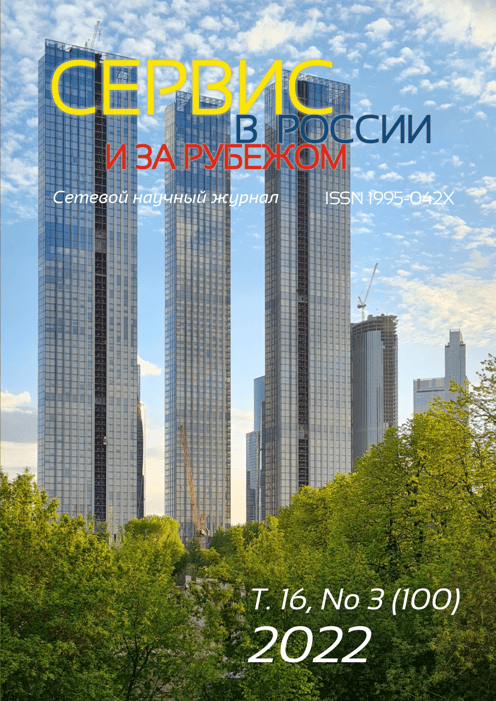Assessment of the conditions and factors of increasing the environmental friendliness of the tourist product of the domestic and world tourism industry
DOI:
https://doi.org/10.24412/1995-042X-2022-3-21-33Keywords:
sustainable tourism, green demand, tourist product, socio-environmental responsibility, tourism industry, SDGs (Sustainable Development Goals), greening of tourism, environmentally responsible behavior, eco-education, standardization, certificationAbstract
The conditions and factors motivating the practice of green tourism, as well as difficulties and obstacles along the way, are formed both on the demand side of the tourist product and on the supply side. The task of analyzing the views, expectations and fears of tourists related to the experience of sustainable tourism and comparing them with the challenges in the socio-environmental responsibility of the tourism business is urgent. An increasingly significant factor driving the transition to the principles of sustainable tourism is the high level of priority of the value of nature in the system of personal preferences of the top management and owners of enterprises of the hospitality industry, caused, among other things, by the growing general concern of the population about the environmental safety of modern and future generations, as well as the aggravated problems of overtourism. An assessment of the dynamics of demand for a green tourist product, an analysis of the processes taking place in the hospitality industry, made it possible to identify factors, tools and mechanisms that stimulate the development of responsible and sustainable tourism in conditions of massive expansion of resorts to adjacent natural territories. The most relevant directions and tools for increasing the competitive advantages of green enterprises of the hospitality industry were identified and justified in modern conditions: education (formation of knowledge and understanding among travelers about the negative impact of brown technologies and about possible ways and conditions of its minimization), confirmation of the actual environmental friendliness of tourist enterprise services (primarily through certification), effective information about the environmental friendliness of the tourist product. The information obtained can become a scientific and informational basis for the development of strategies and programs for sustainable tourism development at the federal, regional and local levels, the formation of marketing and production strategies and plans for environmentally responsible tourism industry enterprises.
Downloads
References
Божук С.Г., Плетнева Н.А., Евдокимов К.В. Стратегии маркетинга экологически ориентированных туристических предприятий // Известия СПбГАУ. 2017. №3(48). С. 124-128.
Галенко Е.В., Криворучка П.О. Предпочтения туриста при выборе экологической гостиницы // Азимут научных исследований: экономика и управление. 2018. №2(23). С. 110-113.
Громов Е.В. Ценностное содержание экологической культуры // NovaUm.Ru (Электронный журнал). 2018. №15. URL: http://novaum.ru/public/p827. (Дата обращения: 05.03.2022).
Каргинова-Губинова В.В., Щербак А.П., Тишков С.В. Оппортунистическое поведение хозяйствующих субъектов: манипулирование экологической ответственностью в экономических интересах // Современная наука: актуальные проблемы теории и практики. Сер.: Экономика и право. 2020. №5. С. 30-35. DOI: 10.37882/2223–2974.2020.05.18.
Ковальчук А.П., Блинова Е.А. Управление конкурентоспособностью предприятий индустрии гостеприимства в современных условиях в России // Российское предпринимательство. 2017. Т.18. №6. С. 917-928. DOI: 10.18334/rp.18.6.37667.
Кротов К.С. Юридическая ответственность за ложную эко-маркировку в России и зарубежных странах // Гуманитарные и юридические исследования. 2018. №1. С. 159-164.
Матова Н.И. Социологическое исследование степени, перспектив и институциональных предпосылок развития «зеленого» туризма в нашей стране. Ч. I: Методологические аспекты. Некоторые результаты опроса // Системы контроля окружающей среды. 2017. №10(30). С. 136-143.
Матова Н.И. Социологическое исследование степени, перспектив и институциональных предпосылок развития «зеленого» туризма в нашей стране. Ч. III: Потенциал спроса на «зеленый» турпродукт и оценка туристами его предложения // Системы контроля окружающей среды. 2018. №13(33). С. 115-122.
Матова Н.И., Шагаров Л.М. Особенности экологически ответственного поведения туристов на охраняемых природных территориях // Современные проблемы сервиса и туризма. 2021. Т.15. №1. С. 93-106. DOI: 10.24412/1995-0411-2021-1-93-106.
Мишулина С.И. Институциональные, организационные и экономические условия «зеленой» трансформации индустрии туризма // Вестник Волгоградского гос. ун-та. Сер. 3: Экономика. Экология. 2018. Т.20. №2. С. 25-36. DOI: 10.15688/jvolsu3.2018.2.3.
Мишулина С.И. Направления совершенствования системы государственного стимулирования экоинноваций в индустрии туризма // Сервис в России и за рубежом. 2020. Т.14. №3(90). С. 69-85. DOI: 10.24411/1995-042X-2020-10305.
Мишулина С.И., Матова Н.И. Особенности проявления социально-экологической ответственности бизнеса в отечественной индустрии туризма // Регион: Экономика и Социология. 2020. №4(108). С. 235-259. DOI: 10.15372/REG20200410.
Нездойминов С.Г. Эколого-экономическая эффективность внедрения «зеленых» технологий в индустрии гостеприимства // Экономика и современный менеджмент: теория и практика. 2013. №27. С. 31-35.
Хлебосолова О.А., Вронский Н.В. Формирование «Поколения Восстановления» как вектор развития туризма и экологопросветительской деятельности на ООПТ // Устойчивое развитие особо охраняемых природных территорий: Сб. ст. VIII Всерос. (национ.) науч.-практ. конф. Сочи: Донской издат. центр, 2021. С. 366–372.
Cerovic L., Drpić D., Milojica V. Green technologies and Sustainable development: factors of competitiveness in tourism and hospitality industry // Proceedings of International Joint Conferences: 11th Confernce of the Asia Chapter & 2nd Conference of the MENA chapter of the AHRD & 10th Conference on Knowledge, Economy and Management. Istanbul, Turkey. November 2012. URL: https://www.researchgate.net/publication/275952911_ (Дата обращения: 25.03.2022).
Costa T., Carvalho L. Sustainable tourism – a benchmarking study applied to hospitality firms // Book of proceedings. Vol. I – International Conference on Tourism & Management Studies. Algarve, Portugal. 2011. URL: https://www.researchgate.net/publication/277204742 (Дата обращения: 25.03.2022).
Dixon S., Clifford A. Ecopreneurship – a new approach to managing the triple bottom line // Journal of Organizational Change Management. 2007. №20(3). Рp. 326–345.
Gómez-Haro S., Ferrón-Vílchez V., De la Torre-Ruiz J.M., Delgado-Ceballos J. What motivates hotel managers to become ecopreneurs: a case study on the Spanish tourism sector. In book: Handbook of Entrepreneurship and Sustainable Development Research. Chapter: What Motivates Hotel Managers to Become Ecopreneurs: A Case Study on Spanish Tourism Sector. Publisher: Edward Elgar Publishing. DOI: 10.4337/9781849808248.00020.
Isaak R. The making of the ecopreneur // Greener Management International. 2002. №38. Рp. 81–91.
Mishulina S.I. Current situation and greening issues in Russian tourist accommodation sector // Services in Russia and Abroad. 2020. Vol.14. №5(92). Pp. 119-132. DOI: 10.24411/1995-042X-2020-10511.
Walley E., Taylor D.D. Opportunists, champions, mavericks …? A typology of green entrepreneurs // Greener Management International. 2002. Iss.38. Рp. 31–43.
Downloads
Published
How to Cite
Issue
Section
License
Copyright (c) 2022 N. I. Matova

This work is licensed under a Creative Commons Attribution-NonCommercial-ShareAlike 4.0 International License.












